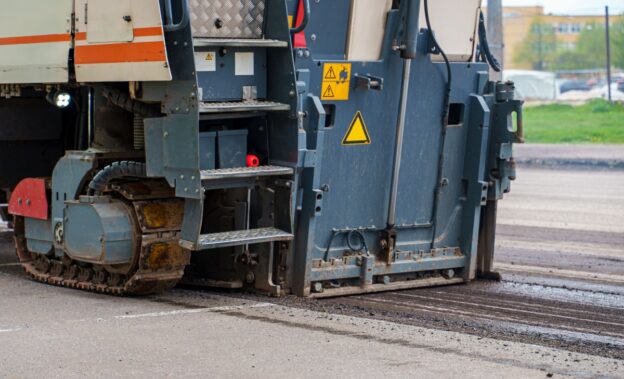In New Jersey and Pennsylvania, roads stretch like veins across each corner of the state, connecting lives, communities, and economies. Amidst our daily hustle, it’s easy to overlook the amount of asphalt that supports our travels and commerce. This vast network of pavement, however, requires expert care and maintenance to withstand the relentless wear of time and traffic. In this context, municipalities face a critical challenge: ensuring the longevity and safety of their roads in a cost-effective manner. Here lies the potential of asphalt milling, a pragmatic and forward-thinking solution.
The Challenges Municipalities Face for Maintaining Asphalt Pavement
Municipalities are trusted with the critical task of making sure that their infrastructure, particularly roads, remains in optimal condition. However, this responsibility comes with its set of challenges due to the many factors that come together to wear down many roads. Each of these factors contributes to the degradation of road quality over time, necessitating efficient and effective maintenance strategies.
Heavier Vehicles
The increase in freight traffic and heavier vehicles on municipal roads has escalated the demand for durable road surfaces. These vehicles exert significant pressure on the pavement, accelerating wear and necessitating more frequent repairs. The impact of these heavy loads can lead to rutting, cracking, and other forms of distress that compromise the structural integrity and safety of the roadways.
Aging Pavement
Over time, all asphalt pavements begin to show signs of wear and tear. Aging pavement becomes more susceptible to various forms of degradation, including cracking, potholes, and surface unraveling. These issues not only affect the aesthetic appeal of the roads but also their functionality and safety. As pavement ages, its ability to withstand the daily stresses of traffic without significant damage diminishes, leading to increased maintenance and repair costs.
Challenging Weather Conditions
In regions like New Jersey and Pennsylvania, roads are subjected to a wide range of weather conditions, from scorching summers to freezing winters. These fluctuations can wreak havoc on asphalt, causing it to expand, contract, and eventually deteriorate. The freeze-thaw cycles common in these areas can exacerbate existing cracks and potholes, making maintenance efforts more challenging and costly.
The Short-Term Benefits of Asphalt Milling
Asphalt milling offers immediate advantages for municipalities grappling with the challenges of maintaining their roads. This process involves removing the top layer of asphalt, which can be damaged or worn, without disturbing the underlying base. The removed material, known as millings, can then be recycled and reused in new paving projects, making this approach both cost-effective and environmentally friendly.
One of the key short-term benefits is the rapid improvement in road surface quality. Milling can correct unevenness, remove ruts, and eliminate surface defects, significantly enhancing driving comfort and safety. Additionally, because milling is less invasive than complete pavement reconstruction, it minimizes disruptions to traffic and local businesses.
The Long-Term Benefits for Your Municipality
Looking beyond the immediate improvements, asphalt milling presents several long-term advantages. Firstly, by recycling the milled asphalt, municipalities can reduce their reliance on new materials, lowering both costs and environmental impact. Additionally, milling can extend the lifespan of existing pavement by allowing for targeted repairs that address specific issues without the need for wholesale replacement.
Milling also allows you to incrementally upgrade roads to meet changing needs or standards. For example, municipalities can use milling to adjust road grades, improve drainage, or even incorporate new technologies into the pavement structure.
Can Perpetual Pavement Be an Option?
The concept of perpetual pavement offers an innovative solution to the challenges faced by municipalities in roadway maintenance. Perpetual pavement is designed to last indefinitely without requiring major reconstruction. This is achieved through a multi-layered approach that combines a strong, flexible base with multiple layers of durable asphalt. Each layer is engineered to absorb different stresses, ensuring the surface remains smooth and intact for decades.
Adopting a perpetual pavement strategy in conjunction with asphalt milling can significantly enhance the resilience and longevity of municipal roadways. With asphalt milling, the top layer of the pavement can be periodically removed and replaced, keeping the surface in optimal condition without ever needing to rebuild the road from scratch. This method conserves resources and reduces maintenance costs over time, providing a sustainable solution to the ongoing challenges you may face.
Stanley Paving Can Simplify Your Asphalt Paving Jobs
In New Jersey and Pennsylvania, the road ahead is clear: embracing asphalt milling can lead to safer, more sustainable, and cost-effective road maintenance. At Stanley Paving, we understand the unique challenges municipalities face and are equipped to deliver high-impact asphalt milling services for municipalities that solve all your needs. Our residential and commercial asphalt milling contractors also deliver fantastic paving jobs for businesses and homeowners in PA and NJ. Contact us today to stay ahead of the curve with asphalt milling.






 866-WE-TOP-EM
866-WE-TOP-EM